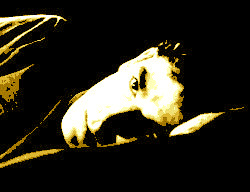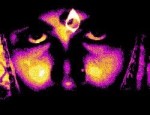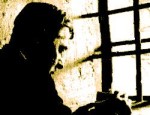Film Review

This is not the first Dostoyevsky adaptation to be attempted by the Russian-born filmmaker Georges Lampin. In 1946, he directed a commendable screen version of the same author's novel The Idiot, with Gérard Philipe memorably cast as the Christ-like title character. Lampin's Crime et châtiment isn't quite in the same league as this earlier film but it is a slick production with a remarkable cast, well-scripted by Charles Spaak and moodily photographed by Claude Renoir. The latter's work is worthy of particular praise as it contributes most to the film's distinctive bleak poetry (hauntingly evocative of the poetic realism of Marcel Carné's films of the 1930s in some scenes) and brings a terrifying intensity to the film's most dramatic moments. Although he had previously appeared in small roles in a number of films, including Jules Dassin's Du rififi chez les hommes (1955), Robert Hossein has his first substantial role in this film as the Raskolnikov-like main character.
It was a daring piece of casting on the part of Lampin (and/or his producers), to give the central role to a comparatively unknown actor, but Hossein proved to be perfect for the part. Robert Hossein is not the most expressive of actors, and his lack of expression, his apparent inability to fully exteriorise his character's inner feelings is the very quality that makes his Raskolnikov so convincing and so disturbing. In only a few shots does the actor show any kind of emotion; for the most part his face is set in a mask of neutral contempt for everything about him. What makes Hossein's Raskolnikov so tragic is the extent of his disconnection from the world of men - his antipathy for society has made him an outsider whose level of emotional engagement with others (excepting those nearest to him, his sister and mother) is sub-reptilian. It takes someone of exceptional compassion - a saintly prostitute played to perfection by a stunning Marina Vlady - to make him aware of the crime he has committed and the necessity for it to be punished.
The film's stand-out performance comes from another well-regarded stalwart of French cinema, Bernard Blier. Blier's Monestier makes a fascinating contrast with Hossein's character, an outright villain with whom, for some reason, we find it much easier to sympathise. Monestier's tragic destiny could have merited a film in its own right and so powerfully poignant is Blier's performance that you can't help wishing it had been so. Jean Gabin receives top billing for what is a pretty routine portrayal of a fairly stereotypical character - not the actor's finest hour, although he does have a commanding Maiget-like presence in his scenes with Hossein. Rising stars Lino Ventura and Gérard Blain both convince us that they are destined for better things, whilst Gaby Morlay, a major star of the 30s and 40s, has her work cut out trying to convince us that she is Robert Hossein's mum. Julien Carette, another French film veteran nearing the end of his career, does a fair amount of scene-stealing at the start of the film. Finally, fleetingly glimpsed in walk-on parts, are two other individuals who would come to prominence in later years - the actress Marie-José Nat and future director of erotic gore fests, Jean Rollin.
It's worth mentioning, en passant, that the film Lampin made directly after this, La Tour, prends garde! (1958), would see the screen debut of another familiar actor, Jean-Pierre Léaud, the 14-year-old star of Truffaut's Les 400 coups (1959). With Gérard Blain also helping to kick-start Truffaut's career with Les Mistons (1957), as well as that of Claude Chabrol and Jean-Luc Godard via Le Beau Serge (1958) and Charlotte et son Jules (1960), you could be forgiven for thinking Georges Lampin's biggest achievement was to act as a kind of talent scout for the French New Wave...
© James Travers 2014
The above content is owned by frenchfilms.org and must not be copied.
Film Synopsis
Paris in the 1950s. Since he had to abandon his studies because of lack of funds René Brunel has become bitter and cynical over how society appears to be organised for the benefit of a wealthy minority. He believes that laws should only apply for those who live like cattle; beings of superior intellect, such as himself, should be free to act as they wish. One day he befriends a drunkard, Pierre Marcellin, for whom alcohol is the only escape from a life of abject penury. When Pierre is mortally injured in an accident, René goes to fetch his daughter Lili, who earns what she can as a prostitute. René's feelings of disgust for society are further intensified when he meets Antoine Monestier, the fifty-year-old antiquarian who intends to marry René's 18-year-old sister Nicole. A wealthy man, Monestier offers the Brunel family the financial security they desperately need, but René is revolted by the notion that a man can buy his bride. Such is René's contempt for low commerce that he murders an elderly pawnbroker in her own home. As police inspector Gallet begins his investigation, René makes every attempt to cover his tracks, but he makes one fatal mistake. The damning evidence falls into the hands of Monestier, who threatens to denounce René to the police unless he acquiesces to his marriage with Nicole. When he confesses his crime to Lili, René is taken aback when she insists that he must give himself up to the police...© James Travers
The above content is owned by frenchfilms.org and must not be copied.
Similar Films
Here are some other films you may enjoy watching:- Macadam (1946)
- La Fille du diable (1946)
- In the Heat of the Night (1967)
- Les Inconnus dans la maison (1942)
- Three Strangers (1946)
Other related links:
Film Credits
- Director: Georges Lampin
- Script: Charles Spaak, Fyodor Dostoevsky (novel)
- Cinematographer: Claude Renoir
- Music: Maurice Thiriet
- Cast: Jean Gabin (Commissaire Gallet), Marina Vlady (Lili Marcellin), Ulla Jacobsson (Nicole Brunel), Bernard Blier (Antoine Monestier), Robert Hossein (René Brunel), Gaby Morlay (Mme. Brunel), René Havard (Inspecteur Noblet), Yvette Etiévant (Madame Marcellini), Gabrielle Fontan (Madame Horvais), Roland Lesaffre (Ouvrier accusé), Jacques Dynam (Le client de Mme Horvais), Albert Rémy (Inspecteur Renaud), Lino Ventura (Gustave Messonnier), Gérard Blain (Jean Fargeot), Julien Carette (Pierre Marcellin), Léonce Corne (Le passant), Jacques Dhéry (Un policier), Jacques Hilling (Le concierge), Marie-José Nat (La jeune fille du bal), Laure Paillette (Une dame à l'église)
- Country: France
- Language: French
- Support: Black and White
- Runtime: 107 min
- Aka: Crime and Punishment
The best of Indian cinema

The best films of Ingmar Bergman

The brighter side of Franz Kafka
